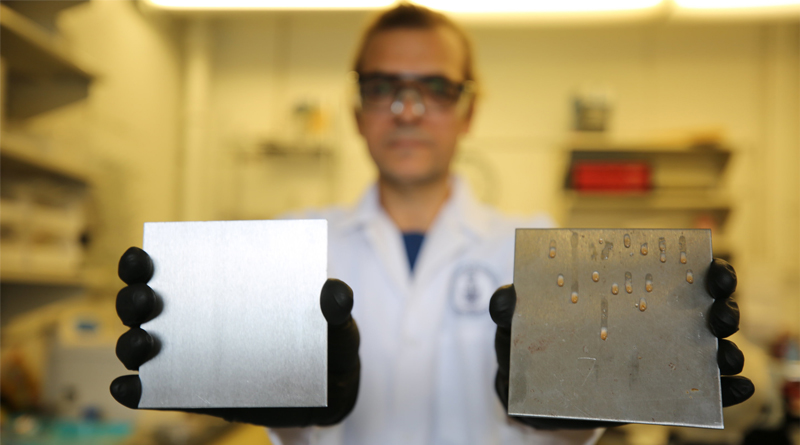Researchers at the University of Toronto have come up with what appears to be an easy and cost-effective approach to reducing the threat of microbial pathogen contamination on food processing equipment: coating it with a thin layer of cooking oil. Scientists in the university’s Dept. of Materials Science and Engineering, working with a food scientist at Alexandria University in Egypt, found that applying a thin layer of cooking oil on the metal surfaces of equipment fills in microscopic scrapes, scratches, and grooves, creating a barrier to bacteria and biofilms. Their work is significant because cleaning equipment can be difficult, requiring the use of harsh chemicals and disinfectants, and foodborne pathogens such as Salmonella, Listeria, and E. coli can be deadly.
“Coating a stainless steel surface with an everyday cooking oil has proven remarkably effective in repelling bacteria,” says research team member Ben Hatton of the University of Toronto engineering faculty. “The oil fills in the cracks, creates a hydrophobic layer, and acts as a barrier to contaminants on the surface.
“For certain steels, we saw a thousand fold (log 3) reduction [in bacterial levels], but for other steels it was even higher, or a hundred thousand fold (log 5),” Hatton says. He adds that “having a ‘log 3’ [reduction] is usually kind of a base standard for disinfection.”
This approach should not affect food taste or composition, Hatton continues, since the choice of oil can be made to match the food type. “For example,” he says, “in a seed processing facility, they can use an oil that matches the seed oil itself.”
Hatton notes that the research initiative is still in its early phases, and there are a variety of other factors, such as oil stability, that must be taken into consideration. Eventually, more large-scale testing on full-sized equipment will be needed. The researchers are experimenting with various combinations of oils to determine which do the best job of pathogen protection. He adds that they are considering oils that are the most stable against wear and oxidation and are interested in receiving input from industrial food processing partners to further advance the project.
Source: IFT








